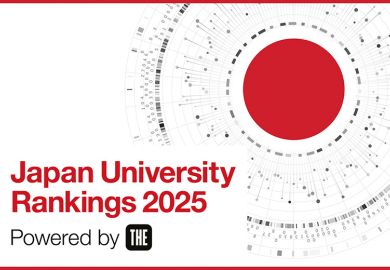Browse the full list of the top 200 institutions in this year's rankings
With a strong emphasis on enhancing their global competitiveness in the knowledge-based economy, many more Asian governments have invested heavily in higher education.
International comparisons clearly show that the investment in research and development in East Asia in particular is now comparable to that in Western Europe and well above the UK.
Being “latecomers” in the international and global research communities, many Asian universities have concentrated funding support to strengthen their research capabilities, working strategically and publishing increasingly in international settings as well as engaging in various forms of scientific and international research in their quest for world-class status.
Such self-enhancing and advancing trends will continue, particularly when increasing numbers of governments in Asia have begun to recognise the importance of research, knowledge transfer, innovation and technology in transforming their economies and societies.
In their quest for world-class status within the context of the “massification” of higher education, governments in East Asia have adopted different strategies to groom some of their universities to become globally competitive. In many instances, state funding has been concentrated on a select few universities to help them perform better in global university rankings (see below).
Meanwhile, there is a growing trend of diversification of funding and differentiation of university missions and visions, especially where national governments are keen to ensure that some of their universities can compete in the global arena.
Recognising that investment in higher education, research and knowledge transfer is vital for sustainable economic growth, more and more Asian universities have embarked on a variety of entrepreneurial programmes, forging strategic university-industry-business collaboration. Some have also altered their curricula and pedagogy to promote entrepreneurial education that will give students the knowledge, skills and attitudes that will help them to adapt to rapid socio-economic changes and embrace diversity in the highly socially, culturally and politically complex world.
Although a growing number of Asian universities are ranked higher in global university league tables, which might confirm that they have achieved higher academic quality, the diversification of funding support and the differentiation of roles inevitably produce stratification and differing hierarchies among these highly ranked institutions.
More socially significant is the fact that the growing diversity and the differentiated positions of universities can worsen inequality of educational opportunities. For example, some national (public) universities in Asia have received preferential funding support, not only from the state but also from the private sector, to help them in their bid for world-class status, while other institutions (especially private ones) have to compete on an unequal playing field.
Such developments raise concerns about intensified inequality among universities and student learning experiences across different parts of the globe.
So could the excellent performance of Asian universities in global rankings pose a threat to other higher education systems? It is my belief that, currently, only a select few Asian universities could challenge the major leading university systems in the West.
As academic standards and quality of research vary across different parts of Asia, whether the rise of some top Asian universities would seriously challenge the top institutions in North America and Europe is yet to be confirmed.
Instead of seeing their Asian counterparts as competitors, universities in Europe and North America should look for opportunities to cooperate, particularly when Asian universities are keen to engage in regional and international research with funding support.
As we confront increasingly complex problems and issues that definitely require inter-university experts for collaboration globally, university rankings should be adopted as a reference for enhancement of performance rather than as an unhealthy driver of competition that could jeopardise the collaborations vital for promoting sustainable growth, social progress and human development.
Ka-Ho Mok
Vice-president
Lingnan University, Hong Kong
Claim a free copy of the full Asia University Rankings 2016 digital supplement
Revving up across the region: in search of excellence
There are across Asia a number of national efforts aimed at building world-class universities. The schemes highlighted all concentrate state funding support to develop a few selected universities to compete globally, as measured by improving performances in international league tables.
China
Project 985 aims to transform China’s most elite universities – Peking University and Tsinghua University – into “super-elite” world-class institutions. The country also has Project 211, which aims to develop 100 key universities and disciplines through targeted funding to improve the quality of teaching and research facilities.
Japan
The country’s Global 30 scheme features a competitive funding allocation method devised to transform a few major Japanese universities into world-class institutions.
South Korea
Brain Korea 21 started in 1996 with the goal of developing home-grown academic talent. The nation more recently launched its World Class University initiative.
Taiwan
The Five-Year, NT$5 Billion Excellence Initiative promotes academic excellence in Taiwan’s universities. The country has also launched its Development Plan for World-class Universities and its Research Centres for Excellence.
Singapore
The city state has established a World Class Universities programme.
Hong Kong
Hong Kong is attempting to position itself as a key international player in higher education through collaboration, research assessment exercises, teaching and learning quality process reviews, management reviews and university governance reviews.
POSTSCRIPT:
Print headline: Going up in the world
Register to continue
Why register?
- Registration is free and only takes a moment
- Once registered, you can read 3 articles a month
- Sign up for our newsletter
Subscribe
Or subscribe for unlimited access to:
- Unlimited access to news, views, insights & reviews
- Digital editions
- Digital access to THE’s university and college rankings analysis
Already registered or a current subscriber? Login







